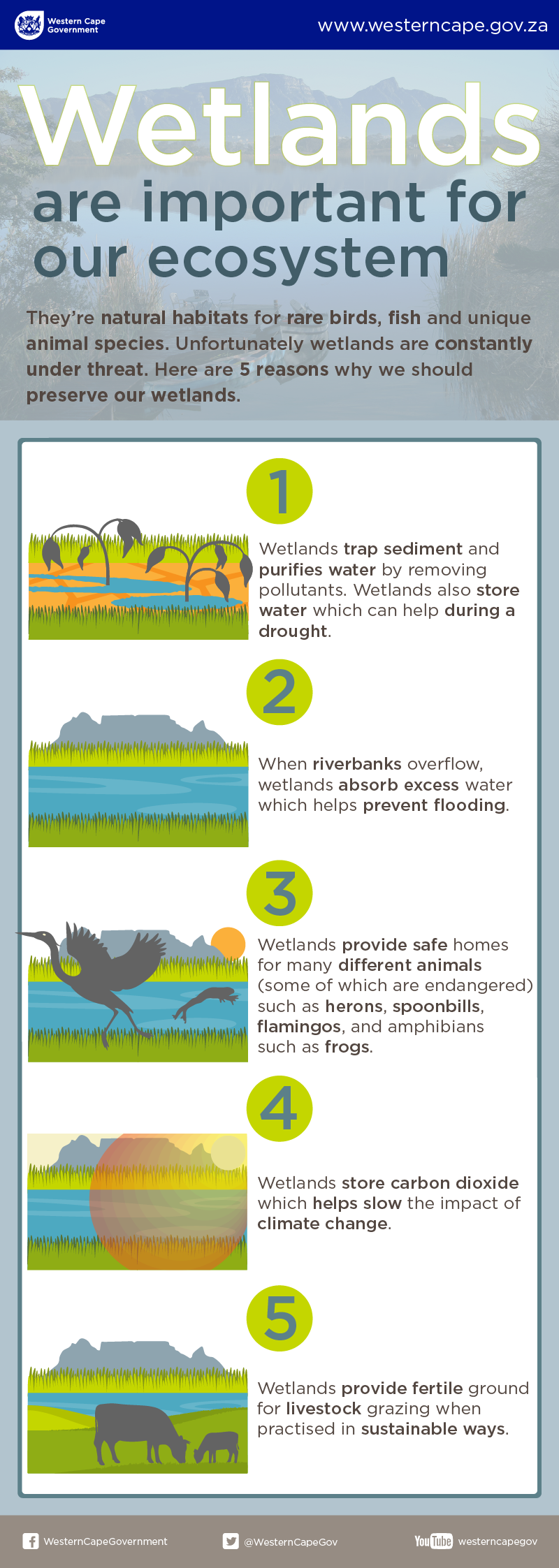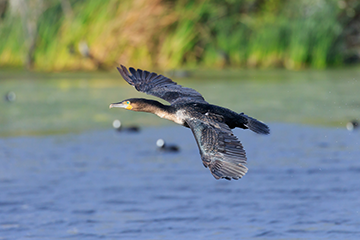Wetlands in the Western Cape
 Wetlands are areas where surface water surrounded by land plays a central part in controlling the local habitat of the plant and animal life living there. Wetlands occur mostly around catchment areas. They include marshes, lakes, rivers, ponds, estuaries and lagoons.
Wetlands are areas where surface water surrounded by land plays a central part in controlling the local habitat of the plant and animal life living there. Wetlands occur mostly around catchment areas. They include marshes, lakes, rivers, ponds, estuaries and lagoons.
The importance of wetlands in our ecosystem
Wetlands are important for our ecosystem because they are a natural habitat for rare birds, fish and animal species. Wetlands also contain a unique diversity of plant life which adds to the capability of wetlands to filter and clean water of natural and man-made pollutants.
We need to preserve our wetlands for future generations because once destroyed rare plant, animal, bird and fish species won’t have a home to live and people won’t be able to enjoy the sights and sounds of the different species living there.
Our 10 recommended wetlands in the Western Cape
In the Western Cape, we have a number of wetlands which you can visit to experience these unique habitats first hand.
We recommend these 10 wetlands in the Western Cape:
1. Edith Stephens Wetland Park
The Edith Stephens Wetland Park is a natural biodiversity area situated in Philippi on the Cape Flats. It's home to several rare plant species and birds such as ibises, egrets and cormorants. The 3.7 hectare Isoetes Vlei, which was entrusted to the Kirstenbosch National Botanical Garden in 1955 by Edith Stephens, after whom the park is named, is the main part of the wetland park.
2. Rondevlei Nature Reserve
The 290 hectare Rondevlei Nature Reserve which forms part of the False Bay Ecology Park was established as a wild bird sanctuary in 1952. In 1986, Rondevlei became a nature reserve which is managed by the City of Cape Town. It has a permanent wetland of 50 hectares surrounded by a narrow strip of land in the north with sand dunes and seasonal wetlands in the south.
3. Zeekoevlei
Zeekoevlei is a 250 hectare lake that is only 30 minutes away from Cape Town. It's bordered by suburbs such as Grassy Park, Pelican Park and Lotus River. Zeekoevlei is 1 of the 6 divisions of the False Bay Nature Reserve. The other 5 divisions are Rondevlei, Slangetjiebos, Pelican Park, the Strandfontein birding area and the Zandwolf coastal sections. You can have a picnic, go fishing, take a boat trip or watch some of the Cape’s rare bird species.
4. Rietvlei Nature Reserve
The Rietvlei wetland is a freshwater lake in Milnerton. Rietvlei Nature Reserve is 560 hectares in size, and it's where people come to view many different birds as well as enjoy watersports, fishing and picnicking.
5. Zandvlei Estuary Nature Reserve
The Zandvlei Estuary Nature Reserve which borders Lakeside, Marina de Gama, Muizenberg and Steenberg, protects 198 plant species. Animals such as the Cape clawless otter, porcupines, Cape dune mole rat and water mongoose call Zandvlei their home. It's also home to 149 species of birds such as the African fish eagle.
6. Berg River Estuary
The Berg River Estuary is located 160 kilometres north of Cape Town. It's tidal and has a flood plain of 61 square kilometres. It's home to 210 bird species.

7. Zoarvlei Wetland
Zoarvlei Wetland can be found between the Paarden Eiland Industrial Centre and the suburbs of Rugby and Brooklyn. It's 140 hectares in size and protects 87 plant species as well as some bird species.
8. Bot River Estuary
The Bot River Estuary is home to more than 178 species of birds including water birds such as fish eagles, flamingos, pelicans and black oystercatchers.
9. De Hoop Vlei
De Hoop Vlei is a coastal lake which stretches for 16 kilometres. This vlei is of great importance to birds and is home to about 260 bird species.
10. Verlorenvlei
Verlorenvlei is a long estuary that stretches between Elands Bay and Redelinghuys, 25 kilometres south of Lambert's Bay on the West Coast. Verlorenvlei is home to over 5 000 birds and sometimes the number increases to 20 000 birds which are any birdwatcher's delight.
False Bay Ecology Park upgrade
The False Bay Ecology Park (FBEP) located within the False Bay Nature Reserve, has a vision to become one of the leading conservation, environmental education, recreation and ecotourism centres in the country. Read more about the False Bay upgrades.


